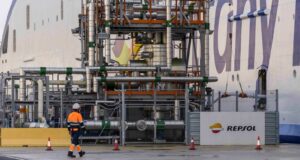Repsol supplies bio-LNG to Brittany Ferries for the first time in Spain

This is the first test of its kind for the two companies, consisting of the supply three truck-loads, totalling 60 tons of bio-LNG, and it is the first supply of its kind in Spain.
The use of bioLNG can reduce the emissions of CO2 equivalent over 100% compared to the use of conventional LNG, depending on the feedstock to produce the biomethane.
Additionally, the use of bioLNG in the ferries does not require any changes to the engines and allows for the same performance of the vessels, as the bioLNG has the same chemical composition as conventional LNG.
The fuel is produced at the first bioLNG facility in Spain located in As Somozas, in the northern Spanish region of Galicia.
It is a produced from waste from the agri-food industry, agriculture, and households, as well as sewage plant sludge.
“This test is the next significant step on Brittany Ferries journey to a more sustainable future,” explained Bertrand Crispils, Head of Energy Transition, Brittany Ferries.
“The first three truck-loads of bio-LNG are the starting gun for Brittany Ferries to progressively substitute fossil fuels with greener alternatives. Combining the use of biofuels with other measures, such as electrification and efficient hydro-dynamics, means we can fully mobilise in the battle to cut greenhouse gas emissions."
Carlos Martin Iglesias, LNG Bunker trader at Repsol said: "With these first supplies of bioLNG, we provide another option for the maritime sector to reduce the CO2 emissions from its activities. This trial is another proof of the commitment of Repsol to the energy transition and to supplying different energy alternatives to help its customers advance in their decarbonization processes."

















